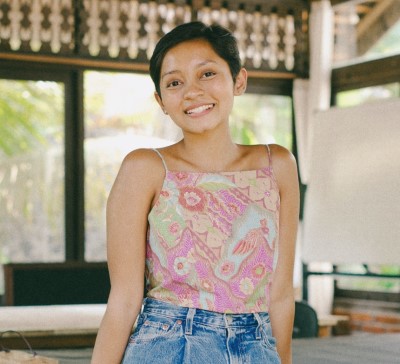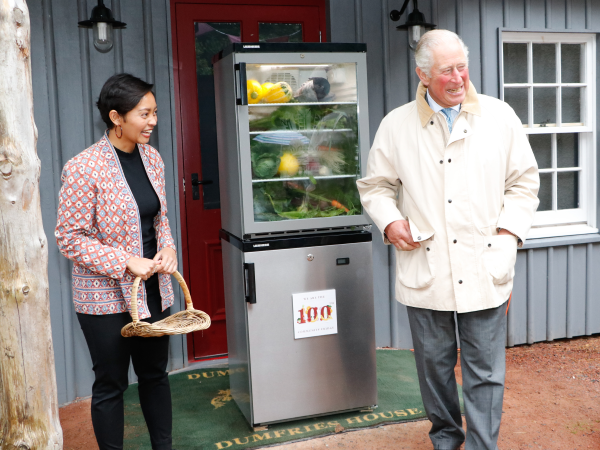Alumni profile - Kana Alam
(Environmental Science BSc, 2016)
I loved the people on my course – some of them have become my best friends and we are still in touch with one another. There was something really comforting and inspiring about being friends with people who care about the same stuff as you, and at the time, climate change wasn’t as mainstream as it is now. It also somehow seemed like Queen Mary just brought the nicest people together, and that made the whole experience so enjoyable.

What attracted you to the BSc in Environmental Science at Queen Mary?
My Mum is an Environmental Engineer, so I grew up hearing stories about (and visiting) landfill sites, community-based sanitation projects and hotel waste management systems. Because we talked about these things so regularly at home, I thought it was the norm for 7-year-olds to know what a landfill looks (and smells!) like. So, when it came to choosing a degree, the only option that made sense for me was Environmental Science.
When I was looking at courses, the only Environmental Science undergraduate degree available in London (which is where I wanted to be) was at Queen Mary. I remember thinking that the course was structured very well with a great balance between theory and practice (field trips), and there were lots of opportunities to specialise in different subjects in third year, from environmental law and policy, ecology, remote sensing, to environmental modelling.
What aspects of your degree did you find most enjoyable and was there anything that surprised you in your studies?
I loved the people on my course – some of them have become my best friends and we are still in touch with one another. There was something really comforting and inspiring about being friends with people who care about the same stuff as you, and at the time, climate change wasn’t as mainstream as it is now. It also somehow seemed like Queen Mary just brought the nicest people together, and that made the whole experience so enjoyable.
What surprised me most was how fun the field trips were. Sure, there was lots of soil sampling (also fun, if that’s your thing!), but mainly it was a really nice way to get to know people on your course. In my first year we went to the Cairngorms National Park in Scotland and it was such a memorable trip. If you ask anyone in my year about it, I can guarantee they’ll talk about it fondly.
Can you describe your career path to date and your current role?
Firstly, nobody told me that it was normal to wait for a few months (or over a year) before you get a job after graduating, and this waiting period can be depressing and anxiety-inducing. The competition for entry-level roles in the environmental sector was especially intense when I graduated.
I truly believe that my degree makes me a confident environmental scientist. I am comfortable talking about the fundamentals of climate change, the role of policies, new technologies to monitor and evaluate environmental conditions, and how to communicate the complexities of climate change in a really digestible way to the wider public.
So instead of focusing on the sector, I asked myself what skills I wanted to learn or develop that I can transfer to an environmental role. I chose to work in project management and community engagement for local authorities in London. I ended up doing that for about two years. It wasn’t related to the environment or climate change at all, but I learned some very important transferable skills. I was surprised at how much I loved community engagement – but perhaps not so surprised when I think back on memories of my childhood visiting community projects with my Mum.
I then worked for the environmental charity, Hubbub, for two years. They run creative campaigns to get people to change their behaviour to be more sustainable, and they do it in a really playful way. I led a campaign to encourage food waste reduction in communities through community fridges, and I got to meet HRH Prince of Wales!  It had the perfect blend of community engagement and science communication. I loved being able to work closely with community leaders who care deeply about their neighbours and the environment – they were truly inspiring.
It had the perfect blend of community engagement and science communication. I loved being able to work closely with community leaders who care deeply about their neighbours and the environment – they were truly inspiring.
You currently work as an Assistant Producer at the BBC where you work on their sustainability campaigns. Can you tell us about any of the campaigns you're working on?
I work in BBC Education (the people who run BBC Bitesize and BBC Teach) and we exist to transform lives through education. We know that over 73% of young people are anxious about climate change and environmental issues and want to know more about how they can help shape and control their futures. With this in mind, BBC Education is developing a sustainability campaign that targets children and young people. I can’t say much more about the campaign at the moment but do keep your eyes peeled on our website!
What are some of the skills you gained through your degree that you use in your work today?
Oh, there are so many. Skills wise it would be time management, writing, science communication and being aware of the bigger picture while focusing on the task at hand. It sounds simple when you write it down like that but knowing how to do them properly makes a difference! I also think that being involved in societies taught me how to work and collaborate with others, and to be a better listener.
More broadly, I truly believe that my degree makes me a confident environmental scientist. I am comfortable talking about the fundamentals of climate change, the role of policies, new technologies to monitor and evaluate environmental conditions, and how to communicate the complexities of climate change in a really digestible way to the wider public.
How did your time and study at Queen Mary help you decide the career path you wanted to pursue?
My tutor, Dr Emily Lines, helped me immensely. She believed in me and my abilities, and encouraged me to pursue what I liked doing as well as what I was good at. I think it’s very important to have a mentor figure or someone who can see the potential in you when you are at university. She definitely shaped my university experience for the better.
I think students often think that they can’t approach their lecturers (for whatever reason), and I just want to remind them that they absolutely can. 99% of the time they would be very happy to talk about careers or give pointers for your essay - they are there to support you!
Outside of your work, you’re a freelance photographer. Is there ever a cross-over between your photography interests and your interest in the environment and sustainability and were you able to nurture your interest in photography while you were a student at Queen Mary?
For a very long time my dream job was to be an environmental photojournalist. I love shooting documentary photography and portraits. I still think about it every now and then, and perhaps someday I’ll pursue it. But for now, what I love doing is creating creative, meaningful campaigns that inspire people to change their behaviour to be more sustainable.
I was president of the Photography Society when I was at Queen Mary, and I would say that my photography improved the most while I was at university. There were so many talented people in the society and I learned lots from them through ‘photo-walks’ and exchanging tips. In my final year, we decided to collaborate with the Experimental Media Forum and QMTV to organize the university’s first art exhibition under the banner of ‘Queen Mary Visual Arts Collective’. I still talk about it in job interviews as something I did that I am really proud of (I don’t think I can talk about it for much longer though, it’s not that recent anymore!). It was hard work but fun, and it was brilliant to see so many artists in Queen Mary who weren’t art students.
What are your hopes and plans for your future career?
That’s a difficult question. I don’t have a plan, but I hope that I can continue to learn and discover what my strengths and weaknesses are and produce the most creative environmental campaigns that I can.
Is there any advice you would give to prospective students who are interested in studying Environmental Science?
It’s a great course and so relevant right now – everyone everywhere is talking about climate change and sustainability. If you do come to Queen Mary to study Environmental Science, have a great time, make lots of friends, try new things and do what your lecturer tells you to do. No, really – listen carefully to what they want to see in your coursework (or more importantly, dissertation) and if you do that you will be just fine.
- Find out more about studying a BSc in Environmental Science at Queen Mary
- Join the Queen Mary Alumni Network
If you would like to get in touch with Kana or engage her in your work, please contact the Alumni Engagement team at alumni@qmul.ac.uk.